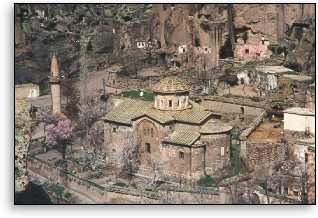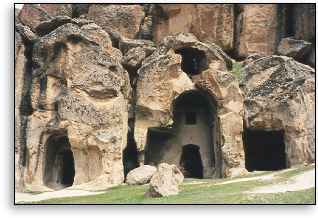Guzelyurt to Konya
Western Turkey - Group Journal
Day 7 -
Friday, 10 April 1998
by Tom and Pat Fritch
Pat and I slept in the Kozelhouse. Communication (with our host family) was possible even without words, with our hands, fingers, arms and facial expressions.
8:30 Breakfast was at the house with the Blue door. We learned how to sit properly on the floor to partake of food. The stuffed pita brad was particularly good.
We crawled over the sofas to find a place for Meli's talk on scarves and Islam. Dennis wondered whether we were preparing for the tunnels again when we were crawling.
Scarves started as sun protection. People of different areas tie the scarves in different ways identifying who they are. The cotton scarves of Turkey all are dyed in one spot. Northern Turkey uses two scarves (with an outer silk scarf) for rain protection. Eastern Turkey women tend to tie the scarves on the side of their head and wrap the scarf around their neck for cold protection. People from the Taurus area wear a fez type hat and tie scarves around it and often place scarves around it. City people tie the scarves in a simple way under their necks. Fundamentalists "close in" themselves with the scarf and often place the scarf in their mouth.
The Islam talk was enlightening to us all. "Religions are to make people happy." Islam is no exception. The focus of Islam is human beings. Humans are models of perfection.
5 Principles (pillars) of Islam
- There is one god - Allah. If you believe in Allah, you are a
Moslem. There are no initiation rites to Islam like Baptism in Christian
Faiths.
- Prayer. Ideally a Moslem prays 5 times a day. Meli showed us
how physical this prayer is and how intentionally it is meant to keep the body
healthy as well as the mind.
- Fasting. For one month during Ramadan a Moslem does not eat
from sunrise to sunset. This is done to show commitment plus to purge the body.
No alcohol or even the use of such things as lemon essence are permitted.
World-wide application of this shows a sense of oneness. "All are equal like
the teeth of a comb." [Allah]
- Charity. Being good yourself is not enough. There is an
obligation to pay 1/40th of your earnings (excluding debt). You must personally
give your gift. You can't just write a check.
- Once in a lifetime you should make a trip to Mecca. Mohammed said "Don't tell me how much money you have, tell me how much have traveled. The idea is to open eyes to outside ideas and other worlds.
Meli then briefly touched on the many types of Islam. She describes these as streams of routes to a central ocean. All are different but end at the same place. Areas of the world often determine the brand of Islam. An example given was Semitic tradition (Arabian) was to kill girl babies before Mohammed. He thought this was wrong. He recommended polygamy where a man can have 4 wives. Shamanistic tradition (in Turkey) believed everything and everyone was equal. There is no history of polygamy in Turkey since women were never less than equal.
Islam embraces 128,000 prophets but 28 are specifically named. Jesus was one of these. Islam accepts all of Christianity except the Nicene creed which states Jesus is God.
The Imam is a social servant as well as a religious leader.
 11:00 a.m. A walk through the village ended on a promontory
overlooking the town. We were asked to close our eyes and listen to the same
sounds of 2000 or more years.
11:00 a.m. A walk through the village ended on a promontory
overlooking the town. We were asked to close our eyes and listen to the same
sounds of 2000 or more years.
A steep decline then led us to a special church built by the Greek Christians in 1887. Kum-bay-ya never sounded so good.
 We then drove to an open area where some rock climbed
and most visited the oldest monastery (from around 400 AD).
We then drove to an open area where some rock climbed
and most visited the oldest monastery (from around 400 AD).
12:30 Lunch at Hotel Karvalla
2:00 We said
goodbye to Karvalla and drove to Konya.

3:30 p.m. Caravan stop in Konya. Meli described how caravans followed roads initially used for trade or military purposes going back to earliest Anatolia. Trade from the orient bringing all its riches west increased their use. The silk road was one road in Eastern Asia but split when major water areas were met.
The caravan stops could accommodate several caravans from diverse areas. They provided places not only for rest but also spots where folk culture could be shared. An interweaving of culture slowly appeared.
Caravans were made of 7 to 15 camels. Many roles were present within the caravan. The bookkeeper was a prominent position. Woman were active in caravans. Mohammed's wife was a caravan owner.
The ride to Konya was taken up with questions and answers. The most complex answer was Meli's explanation of the complex issues surrounding the Armenian story. A sad saga, but indeed a complex story in Turkish history.
The day ended with dinner at the Hotel Sifi restaurant. The cheese flat bread was particularly netis (delicious).